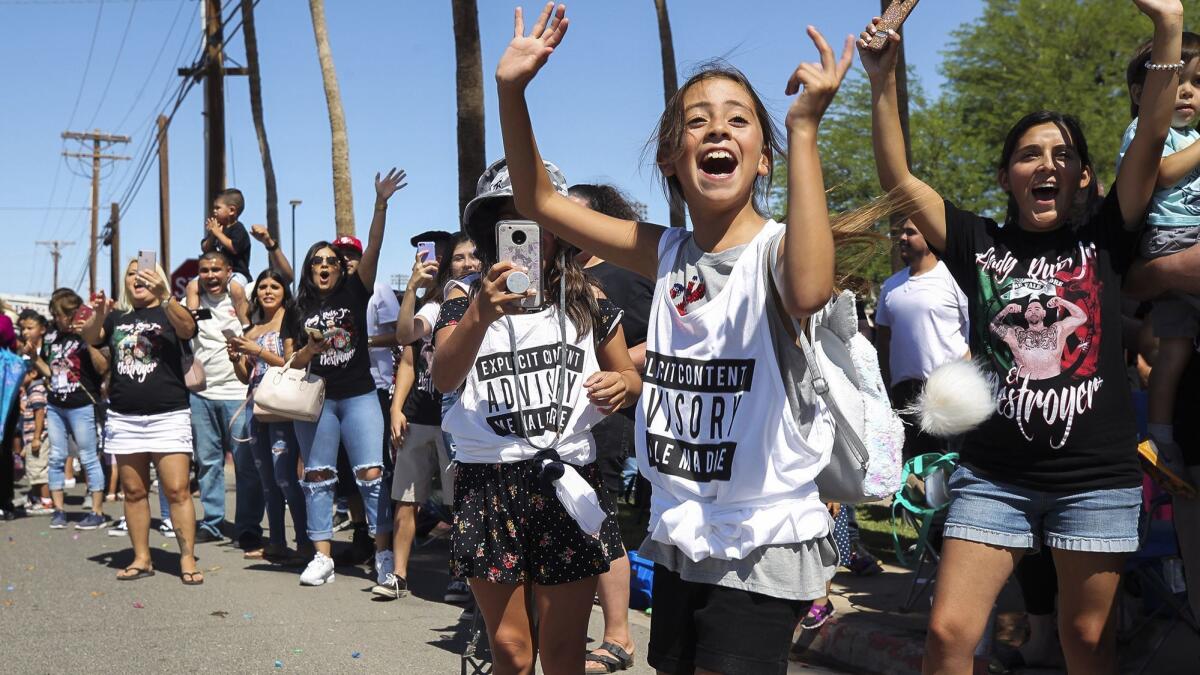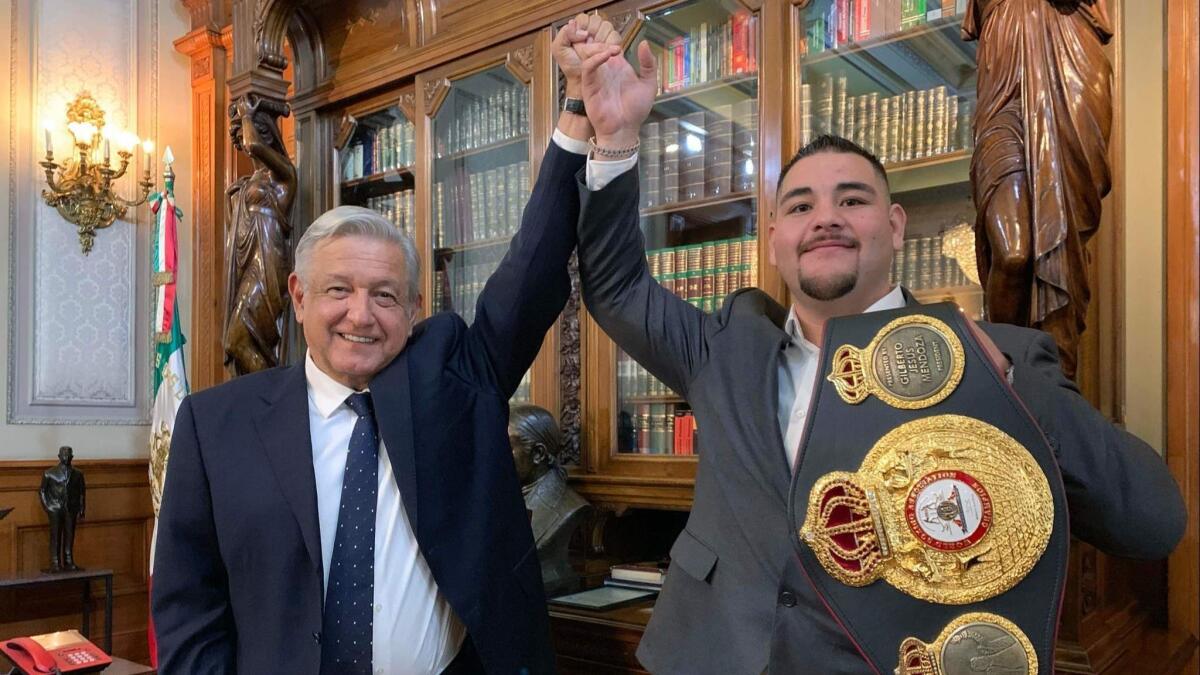Column:: It’s a big victory for Andy Ruiz Jr. and Imperial Valley
- Share via
Over the eight blocks the police officers escorted the purple Rolls-Royce, the same instruction was shouted hundreds of times.
“Sidewalk!” the officers told the crowd over the sirens of the unmarked police car that was closely behind, pointing to the concrete walkway lining the small streets.
The instructions were politely ignored.
The most the crowd did was back up a step or two. The people continued walking alongside the Rolls-Royce. They were practically a part of the parade.
Which made sense.
Andy Ruiz Jr. was still one of them, even after becoming boxing’s heavyweight champion three weeks earlier with an upset of Anthony Joshua.
The city of Imperial, which is about 15 miles north of the U.S.-Mexico border, has fewer than 17,000 residents. Here, Ruiz isn’t the chubby boxer with deceptively quick hands; he’s Andres’ son, the one who still lives in the city and is a regular at Johnny’s Burritos down the street.

Ruiz didn’t mind the crowd’s encroachment.
The 30-minute parade Saturday morning was like a conversation. The people weren’t shouting at him as much as they were talking to him.
“Hey, mijo!”
“Way to go, Andy!”
“¡Buen hecho!”
Ruiz pointed and waved at familiar people in the crowd.
Before reaching Imperial High, where city and county leaders would honor him, the vehicle came to a stop. Ruiz removed the championship belt that was on his left shoulder and held it up with both hands.
The crowd cheered.
“I’ve never experienced anything like this,” said Ruiz’s Los Angeles-based trainer, Manny Robles.
Ruiz later climbed on the stage that was set up on the school’s football field and addressed the crowd.
“I love all the Imperial Valley, man,” he said. “I love you guys.”
::
This is the kind of place where everyone knows everyone. Or if they don’t know someone, they at least know someone who does.

County Supervisor Michael Kelley, who awarded Ruiz with a medal of merit, lives in a house that Ruiz’s father helped him build.
Imperial Police Chief Leonard Barra was involved in a Police Athletic League when Ruiz started boxing.
Unique Gamez, who works at Johnny’s Burritos, is Ruiz’s cousin. Gamez’s grandmother and Ruiz’s mother are sisters.
The third-generation proprietor of Johnny’s Burritos, Ruby Palomino, didn’t know Ruiz and isn’t a boxing fan. But she knows Ruiz’s father because she sees him at the drive-through window almost every day.
The original Johnny’s Burritos is in the nearby farming town of Brawley, the hometown of major league pitcher Sergio Romo.
Romo’s mother used to work at the Brawley location.
The other major league pitcher Brawley produced in recent decades was Rudy Seanez, who pitched for the Dodgers during a 17-year career.
Palomino’s father attended Brawley Union High with Seanez.
“That’s the one thing I love about the Valley,” Palomino said.
And in recent weeks, they watched someone from their web of relations not only become a world champion, but also appear on “Jimmy Kimmel Live!” and visit Mexican President Andrés Manuel López Obrado.
But even the locals who don’t know Ruiz or his family feel as if they share something with him.
Ruiz was offered a chance to challenge Joshua only because Joshua’s original opponent flunked multiple drug tests. The people here listened as Ruiz was disparaged in the buildup to the fight, as he was subjected to fat-shaming masquerading as analysis.
They could relate to the slights. In a news conference Friday, a local Spanish-speaking reporter remarked to Ruiz how the region is often disrespectfully called “the desert” rather than by its actual name.
Fernando Lara, the founder of the Sparta Boxing Gym in neighboring El Centro where Ruiz occasionally trains, said he noticed a familiar look on Ruiz before his fight with Joshua.
“He would have this kind of almost between a smirk and smile,” Lara said. “Like a I-know-something-you-don’t-know type of thing.”
Camped out near the end of the parade route was Al Miramontes, a 62-year-old retired law enforcement officer. As he spoke about what Ruiz’s triumph meant to the area, his bottom lip started to quiver.
Asked what about Ruiz’s story made him so emotional, Miramontes paused and took a deep breath.
“It hits at the heart,” Miramontes said. “A lot us in this county had real humble beginnings.”
And many of them went on to become respected members of the community, police officers and doctors, teachers and fire fighters. Ruiz’s triumph reflects theirs.
::
On his right biceps, Ruiz has a tattoo that reads, “Hecho en Mexico,” which is Spanish for “Made in Mexico.”
As a fighter, he was.
Sign up for our daily sports newsletter »
Imperial’s location placed him more than three hours from the boxing cradle of Los Angeles, but also offered him an alternative on the other side of the U.S.-Mexico border.
“From the time I was small, I was always training, going from here to Mexicali, an hour to get there, an hour to get back,” the bilingual Ruiz said in Spanish. “It was a good experience fighting in Mexicali and gaining experience.”
Ruiz was born in the United States but was also a citizen of Mexico because his father was born there. He competed in the Mexican Junior Olympics and came close to representing his ancestral homeland at the 2008 Olympics.
The mixing of cultures is common in these parts.
“The border’s just an idea,” Imperial City Council member Darrell Pechtl said. “The fact is, in our community, the border is a line that’s crossed every day by families on both sides. We are a fluid culture. We are a blended culture and we’re very fortunate about that. Our shoppers go to both sides. I dine on both sides of the borders.
“This is how we’ve grown up in the Valley.”
Pechtl said Mexicali residents cross the border for special events, such as the Parade of Lights in Imperial, the Christmas Parade in El Centro and the Cattle Call Rodeo in Brawley.
So if Ruiz’s victory was the Imperial Valley’s, it was also Mexicali’s.
The parade Saturday included a truck carrying several people close to Ruiz. At one point, one of them raised one of Ruiz’s championship belts and shouted, “Arriba Chicali!”
Chicali is a nickname locals have for Mexicali.
Miramontes, the retired law enforcement officer who was watching, remarked how the region now had two world champions in boxing. The night before at Fantasy Springs Resort Casino in Indio, Elwin Soto of Mexicali stopped Angel Acosta of Puerto Rico to win a version of the light-flyweight title.
::
Ruiz’s triumph mirrors Imperial’s growth and ambitions.
The city’s population nearly doubled between 2000 and 2010, from 7,695 to 14,758, according to U.S. Census data.
The region’s development is particularly obvious in Imperial’s more populous neighbor, El Centro. On North Imperial Avenue, there’s a Costco and a Walmart, as well as any fast-food chain restaurant imaginable.
Further south, past Interstate 8, is the Imperial Valley Mall, which opened in 2005.
Nearby are a Best Buy, a BevMo, an Olive Garden and a handful of national chain hotels.
Shoppers from the other side of the border have helped sustain the growth, but the driving force has been the increase in government jobs in the area.
Two state prisons have opened in the county in the last 27 years. Many federal agents are stationed here because of the area’s reputation as a drug corridor.
“We have land, we have water, we have people,” said Kelley, the county supervisor. “This will be the next Phoenix in the years to come.”
Community leaders are hopeful development could do for the region what Ruiz is doing: drawing attention.
Athletes who emerge from this region often almost do so by accident. Romo graduated from high school without any scholarship offers from four-year schools. Seanez said he was discovered only because there was a scout who was supposed to watch a game in Yuma that was rained out. On his way home, the scout saw lights on at a nearby baseball stadium.
The scout decided to drop by as Seanez was in the process of throwing a no-hitter.
“The problem is always that we’re isolated,” said Pechtl, the Imperial council member.
“People often drive through. We need to make this a culture [that] people drive to.
“When you become a community you drive to, people see what you have to offer and they give you more opportunities for your children.”
::
Ruiz’s success wasn’t only symbolic. The upset over Joshua offered immediate and tangible benefits for the Sparta Boxing Gym, which shares a building with an auto parts store.
A former juvenile delinquent who turned around his life and became a police officer, Lara founded the gym as a way to give back to the community. The cost of membership is $40 a month, but Lara waives or covers the fee for children who can’t afford it.
“We’ve been struggling the last couple years to stay alive,” Lara said.
With rent increasing and membership decreasing, the gym was in financial trouble last month.
“Andy’s blessing,” as Lara called it, changed everything.
In the aftermath of Ruiz’s victory over Joshua, the number of members more than doubled, from 20 to more than 50.
Lara received more uplifting news this week, when he learned Johnny’s Burritos would donate to the gym a share of its proceeds from Saturday. The restaurant was along the parade route.
Ruiz said the first purchase he made with his earnings from the Joshua fight was a car for his mother.
“I messed up a lot of her cars when I was young,” he explained.
Ruiz now wants to do something for the area’s youth. He recognizes he accomplished what he did only because of the time and money his father invested in him.
“There’s a lot of kids around here that have a lot of talent,” he said. “They just need that extra help. A lot of kids, they don’t have the extra help with their parents. I’d love to do that.”
He encouraged children to dream.
“You got to dream, man,” he said. “You got to dream big. Everybody that has a dream, they got to dream big and believe it. Believe it, believe it and it will come true, man. It really will.”
He’s already taught them how to do that.
Follow Dylan Hernandez on Twitter @dylanohernandez
More to Read
Go beyond the scoreboard
Get the latest on L.A.'s teams in the daily Sports Report newsletter.
You may occasionally receive promotional content from the Los Angeles Times.











